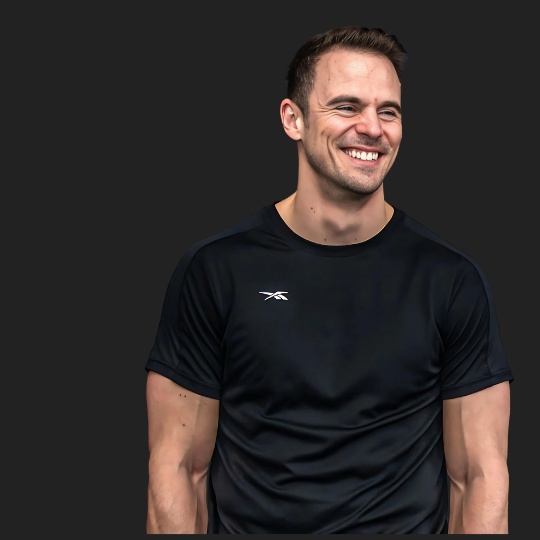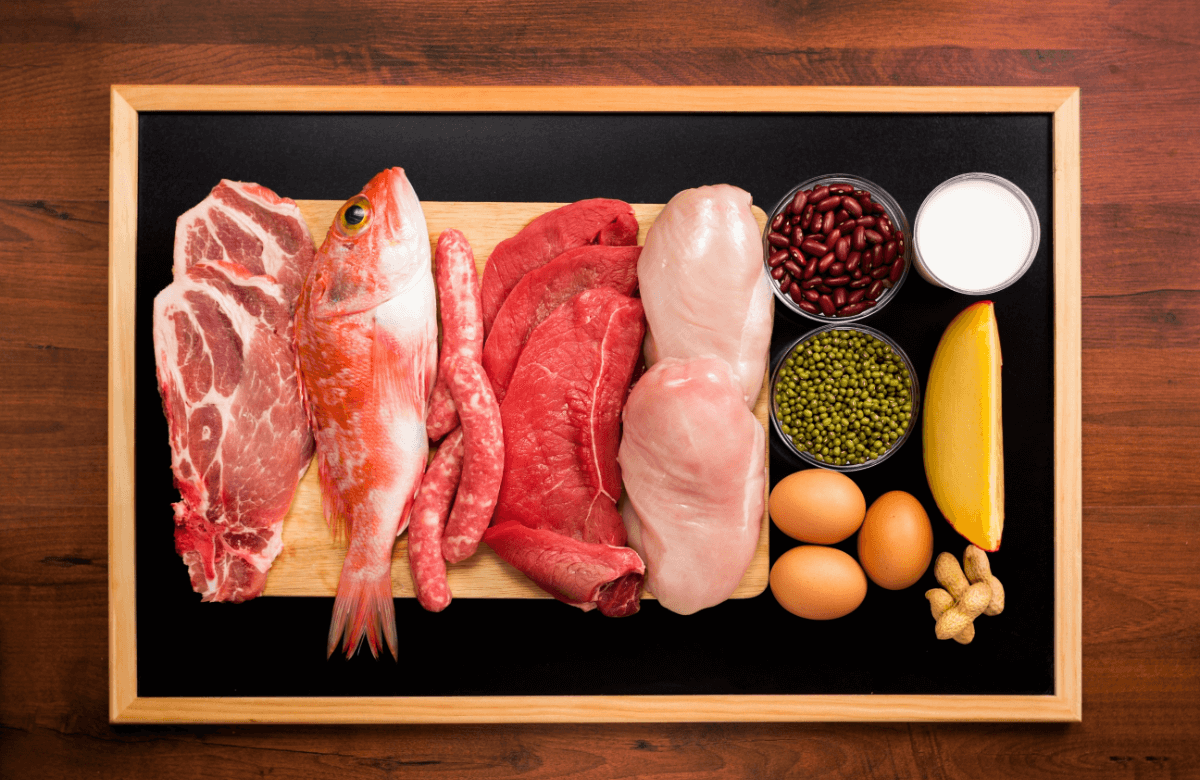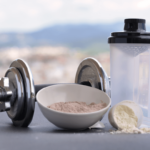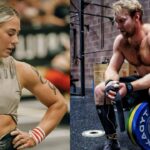Researchers and health experts have all suggested that protein is necessary for building muscle. Many experiments and studies have also shown that increasing protein consumption can help maintain muscle mass and encourage more rapid muscle growth. It’s all part of muscle protein synthesis.
But do you know what are the most protein-dense foods? Keep reading to learn more about the importance of protein in building muscle, good sources of protein, and some effects of protein in your diet.
Jump to:
- What Is Protein?
- 15 Most Protein-Dense Whole Foods
- What About Protein Supplements?
- Protein from Food vs. Protein from Supplements
- The Importance of Protein in Building Muscle
- How Much Protein Do You Need to Build Muscle?
- Should Protein Intake Change As You Age?
- How Much Protein Should You Have? Protein Calculator
- When Is the Best Time to Consume Protein?
- FAQs About How Much Protein to Build Muscle
What Is Protein?
Your body is full of proteins, which are complex substances that build and shape cells within your body. They’re a combination of amino acids and peptides that join together to support the body’s growth and function. It’s one of many key nutrients your body needs for growth and development.
There’s protein content in virtually every tissue, and they help to create hormones and enzymes that produce chemical reactions throughout the body. It’s also vital in repairing and growing the cells in muscles and bones.
The human body can manufacture some essential amino acids, but not all. That’s why it’s essential to get adequate amino acids through protein-dense foods.
15 Most Protein-Dense Whole Foods
You can find protein in a variety of foods, but not all protein sources are the same. Nutritionists suggest that proteins with the nine essential amino acids are the best protein sources.
We also should avoid proteins high in fat or sugar because these foods can lead to other health complications. The best source of protein Is whole foods, which are basic, unprocessed, and natural foods. Whole food proteins are full of vitamins, minerals, and fiber. They are an excellent option for protein because they have essential amino acids and no other added ingredients.
Getting adequate amounts of these foods in a balanced diet will easily help you get enough protein in your dietary allowance. Keep reading to learn a little more about each high-quality dietary protein option.
1. Chicken
The most widely-known source of whole-food protein is chicken breast. This all-white meat boasts 27g of protein per 100 grams or 3.5oz of chicken. When you’re trying to hit your macros and promote muscle growth, cooking up a skinless chicken breast or two is easily one of the best ways to achieve that goal.
2. Eggs
There’s a reason bodybuilders talk about putting raw eggs in their daily protein shakes: Eggs are an excellent source of protein. You’ll find about 6g of protein in every whole egg. About 60% of that protein comes from the egg white and the rest is found in the yolk. While some people suggest only eating egg whites, the fat found in eggs can also promote good cholesterol and muscle health.
Eggs are among the best sources of protein for those looking to support muscle growth simply because of their convenience. You can whip up 30g of protein with five scrambled eggs in about 5 minutes, so it’s an easy way to get your protein boost without supplements.
3. Turkey
Turkey is another complete protein that offers everything you need for a dense protein diet. A whole roasted turkey contains a whopping 29g of protein per 100g. It’s a great alternative to chicken when you want a slightly different flavor to fuel your dietary protein intake.
The white turkey breast is the most protein-dense while the more fatty parts of the bird, such as the legs and thighs, contain fat alongside the protein. Keep that in mind the next time you grab a turkey leg from the state fair!
4. Pork Loin
Lean pork is also a great protein source. While certain cuts of pork contain excess fat alongside the protein content, the pork loin is a tender, lean meat that’s an excellent source of protein. You’ll find 27 grams of protein in each 100g of pork loin. Compare that to pork butts, which have 23 g of protein and 19g of fat per 100g. When cooking with recipes that call for pork butts or shoulders, consider switching it out for pork loin for a little extra protein per bite.
5. Lamb
Lean cuts of lamb, such as the leg, shoulder, or loin, are low in fat and high in protein, making them a great source of protein to help build muscle. You’ll find 25g of protein in 100g of lean lamb cuts. It’s a complete protein source with all 9 amino acids in one serving.
6. Venison
The protein density in venison is exceptional. It’s easily one of the best animal protein sources as it’s very low in fat and contains an incredible 30g of protein per 100g of meat. The fat content is low, so you’re getting more calories from protein in a cut of venison than fat.
A study published in the National Library of Medicine revealed many healthy properties of consuming deer meat, particularly highlighting its high-protein, low-fat composition. It also contains fatty acids, which promote cell structure and function, therefore aiding in muscle growth among other things. With these findings, study authors suggest more people integrate deer meat into their diets.
The gamey flavor of venison may not be for everyone, but it’s truly an excellent way to get your daily protein requirement.
7. Fish
Fish of all varieties are a good protein source. If you want greater nutritional benefits all around, go for fatty fish such as tuna, salmon, mackerel, herring, anchovies, mussels, and trout. Fatty fish are an excellent source of protein, and they contain important nutrients like omega-3 fatty acids that the body needs.
White fish such as cod, flounder, tilapia, halibut, sole, snapper, grouper, catfish, and haddock, also make great sources of protein, although they lack some of the nutrients that fatty fish contains.
Canned tuna is a very protein-dense and highly accessible fish. It makes a great snack or sandwich, and with 24g of protein in just 4oz. It also contains all the health benefits of fatty fish.
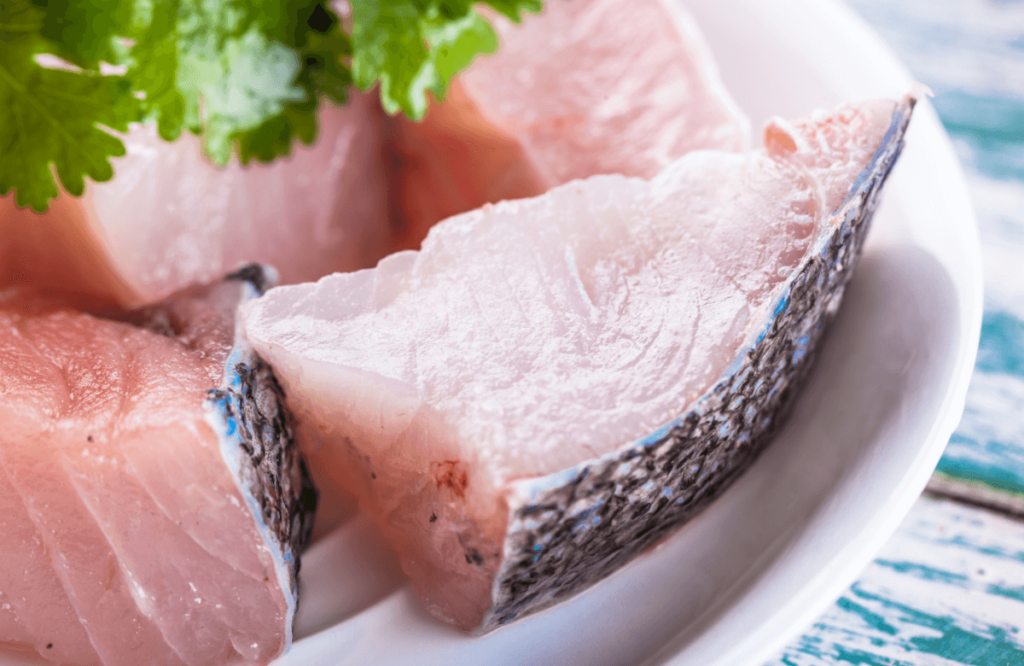
8. Lean Beef
You’ll get 26g of protein in 100 grams of lean beef. Lean beef is any cut that contains less than 10g of total fat, and only 4.5g can be saturated fat. The most common cuts of lean beef include 90% or more lean ground beef, tenderloin, top sirloin, t-bone steak, and flat-half brisket.
Fatty forms of beef also contain high levels of protein, but the fat content removes some of the nutritional value of the meat. Therefore, it’s important to consume more lean meats for a healthy diet.
9. Greek Yogurt
Greek yogurt is one of the best vegetarian protein foods out there. At 10g of protein per 100g serving, it’s a great way to get protein without relying on meat.
A study published in 2019 suggests that eating Greek yogurt after working out could lead to greater muscle gains. Young men in the study who ate Greek yogurt after each workout over 12 weeks saw more muscle strength and thickness and less fat than those who ate nothing.
This protein-rich food is easy to find in most grocery stores and makes an exceptional snack on the go. Add some nuts and fruit, and you have a highly nutritious breakfast or post-workout snack.
10. Nuts
Nuts, like peanuts or almonds, are a fantastic whole-food protein. Almonds have six protein grams in 1 gram of almonds. Almonds are also a great source of fiber, vitamin E, manganese, and magnesium, making them a tremendous whole-food protein. Eating almonds can also help lower cholesterol and blood pressure levels.
11. Milk
Milk is an excellent protein source, whether from dairy or non-dairy sources. One cup of dairy milk gives 8.32 grams of protein. Milk is also a good source of vitamins and minerals, including calcium, phosphorus, and riboflavin. Other non-dairy milk sources, such as soy or almond milk, are good whole-food proteins and a superb choice for those who are lactose intolerant.
12. Cottage Cheese
One cup of cottage cheese contains an amazing 25g of protein. Mix creamy cottage cheese with peaches or another fruit, and you have a tasty post-workout snack that’s easy to take on the go. You can also enjoy cottage cheese pancakes for breakfast. This vegetarian protein product is easy to incorporate into your diet to maximize your protein content.
13. Legumes
Legumes, such as lentils, are one of the best plant-based sources of proteins, making them a unique whole foods protein source. Lentils have over 9 grams of protein in 100 grams of lentils. They are also a great source of fiber, folate, magnesium, potassium, iron, copper, and manganese. Plus, studies have shown that individuals who regularly eat lentils have a reduced risk for heart or fatty liver disease.
14. Quinoa
Quinoa is a whole grain and an amazing protein and fiber plant food. It’s one of the best plant-based protein sources and is one of the only vegetable sources of the nine essential amino acids. Therefore, for those who wish to supplement animal-based proteins in their diets, quinoa is a perfect choice. One cup of quinoa gives eight grams of protein.
Quinoa is also a superb folate, copper, iron, and zinc source. It boasts many healthy benefits, including boosting metabolic health. A PubMed study showed that those who consumed quinoa regularly had lower cholesterol and had an easier time losing weight, indicating a metabolic benefit.
15. Natural Peanut Butter
There are few things more comforting than a classic peanut butter sandwich, and it’s also a great source of protein too! You get about 7g of protein in a 2TBS serving of peanut butter.
Be aware that many peanut butter on the market today may contain added sugars and other additives that minimize the healthy nature of classic peanut butter. Always opt for natural peanut butter with no or minimal added sugars to get the benefits of peanut butter without the extra carbs.
What About Protein Supplements?
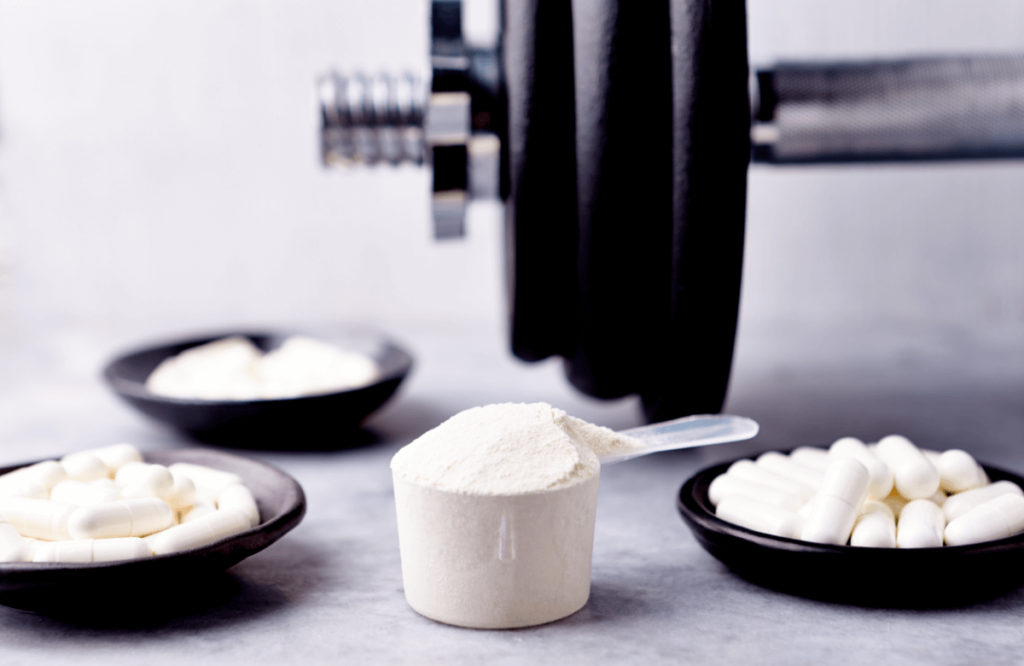
Protein shakes or supplements are also a fantastic way to introduce protein into your diet, especially if you struggle to get enough protein in the foods you need, or you want a quick and easy way to supplement your protein intake.
There are many types of protein sources in supplements, and there are many options depending on your goals. Some of the top brands include Now Sports, Optimum Nutrition, Orgain, and Vega Sport. Keep reading to learn more about each of these top brands.
Keep in mind that whole foods are the best way to get your daily calories from protein. However, supplements are useful in helping you reach your daily protein target when you’re struggling to get it from whole foods alone.
Now Sports
Now Sports, a branch of the Now Health company, makes sports nutrition supplements used to enhance performance. Now Sports products are high-quality protein supplements certified by Informed-Sport, the world’s leading anti-doping organization. So, you can trust that products from Now Sports are pure, safe, and effective for athletes at any level.
Optimum Nutrition
In business for over 30 years, Optimum Nutrition has been a top brand for sports supplements for professional athletes, personal trainers, and gym enthusiasts. Their products only use the best ingredients with the strictest manufacturing procedures in the industry, ensuring you get a high-quality protein supplement.
Orgain
Organi’s three company goals are clean nutrition, delicious taste, and high-quality protein sources. Orgain products are pure and certified organic whenever possible. They also make their supplements without soy, carrageenan, or GMOs. You can also expect no artificial flavors, colors, or preservatives.
Additionally, the company advertises its products as the smoothest, creamiest, and most delicious products on the market. Plus, Orgain searches high and low for the highest quality ingredients to maximize nutrition.
Vega Sport
Vegan triathlete Brendan Brazier founded Vega in 2001 when he couldn’t find a high-performance supplement on the market. Vega has become a full-range manufacturer of plant-based products for all activity levels and goals. They are also B Corp certified, which means they meet stringent safety, environmental, and social standards, so you know you’re getting a high-quality, environmentally friendly product when you purchase Vega Sport.
Protein from Food vs. Protein from Supplements
Nutrition experts suggest that natural whole-food protein sources are a better option when compared to protein supplements. Protein from foods is cheaper, has more nutrients and health benefits, and absorbs better into your body than protein supplements.
However, there are some reasons for choosing protein supplements over protein from food. Older individuals with limited appetites, people with restricted diets, and trained professional athletes may all benefit from adding protein supplements to their diets.
Sometimes, it’s just more convenient to grab a protein shake, too. Busy, active people might struggle to cook a lean meat meal after a workout, but they can grab a protein shake and move on.
The Importance of Protein in Building Muscle
You know that resistance exercise and consistent weight lifting are important for muscle, but what you eat also matters. Protein is vital for building muscle because it’s made of amino acids, the main building blocks of muscle. The body can make many of the amino acids needed for muscle protein synthesis, but there are nine essential amino acids from protein that the body cannot make and must get from our food.
Also, protein matters because your muscle tissue constantly runs through a cycle of muscle protein accretion, or regrowth, and muscle protein breakdown. We need to consume protein in our diet to rebuild muscle efficiently.
To build muscle, we must consume more protein than what we lose when our muscles break down. Therefore, healthy adults who are active and more likely to stress muscles during workouts or those with health complications that can lead to muscle loss may benefit from additional protein consumption to help rebuild their muscles.
Additionally, if a person does not have a high enough protein intake, then the body will break down muscle to get the amino acids it needs to fuel other essential bodily functions. Therefore, protein is critical not only for muscle growth but also for preventing muscle loss.
How Much Protein Do You Need to Build Muscle?
Knowing how much protein you need to build muscle can be a difficult question to answer because there are a lot of factors to consider, including age, weight, height, gender, overall health, and activity status. It also depends on whether you want to build lean body mass or bulk up.
So how much protein per day do you need to build muscle? Some experts recommend 0.75 grams per kilogram of body weight. However, this recommendation is generally given to sedentary individuals who are not very active.
This recommendation would be too low for active and athletic people. It would be deficient for muscle building. So, experts recommend between 1.2 and 1.6 grams of protein per kilogram for the average person.
And, for a weightlifter or someone who wants to build muscle mass, experts suggest increasing protein intake to up to 2 grams of protein per kilogram or 0.9 grams per pound.
Should Protein Intake Change As You Age?
Protein requirements vary for different ages in life. In fact, health studies have confirmed that protein needs increase as individuals age. You might have a higher percent body fat as you age, which will affect your protein needs.
You lose muscle mass as you age, and increased daily protein intake helps reduce muscle loss and build muscle, whether you’re aiming for lean mass gain or bulk gain.
Current students suggest people over 65 should aim for 1 to 1.2 grams of protein per kilo of body weight to maintain and build muscle mass and function. Elderly persons should speak with their primary physicians about how much protein they need per kilo of body weight.
It’s not a bad idea for healthy people in general to speak with their healthcare professionals about their protein needs. Along with using standard calculations, they will likely ask you to keep a food journal and monitor your food intake to observe how protein affects you and how much you may need.
How Much Protein Should You Have? Protein Calculator
How much protein you need depends on multiple factors, including age, weight, body composition, health goals, and physical activity level.
The National Institutes of Health recommends a daily minimum of 0.36 grams per pound of body weight for a sedentary individual. But, athletic or active individuals will need higher protein intake to maintain and build muscle and perform necessary bodily functions.
With a simple math equation, you can figure out how much protein you need in your diet or look online for a protein intake calculator to help you discover how much protein you need.
Once you know how much protein you should be eating, you can purchase an inexpensive food scale to help monitor your protein intake. It’s a much more accurate method of monitoring your macronutrients and ensuring you get the proper amount of protein within your daily calorie target.
When Is the Best Time to Consume Protein?
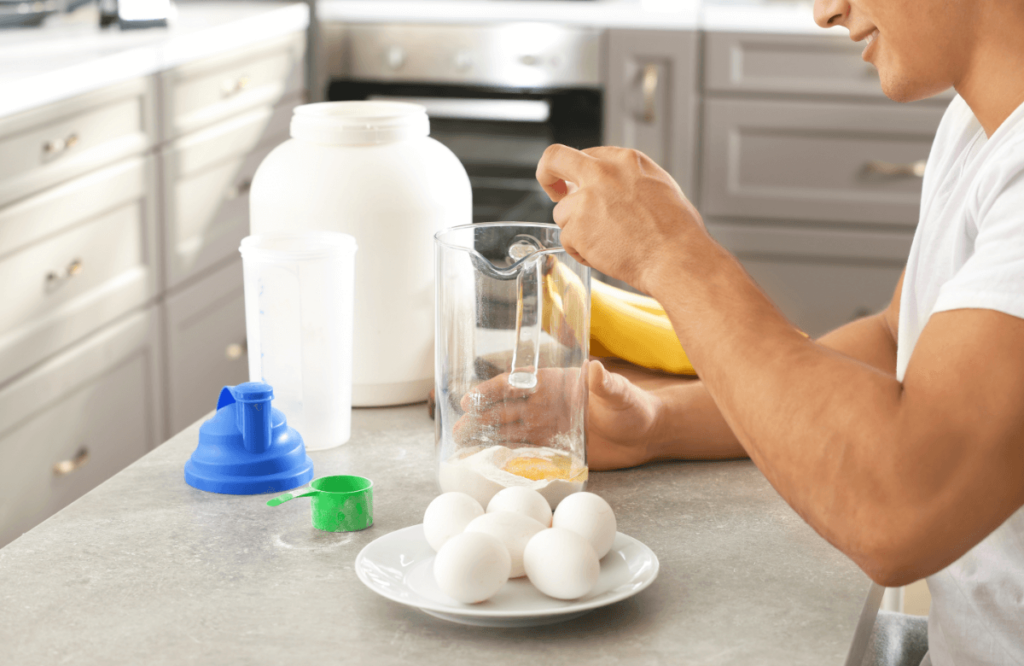
Meal timing can influence how well your body uses protein. The optimum time for consuming protein is dependent on your health needs. Whether weight management is your goal or you want to gain or maintain muscle mass, each goal has different recommendations for when to consume protein.
If you want to lose weight, experts recommend a protein-rich diet and suggest that protein snacks between meals can help curb hunger and help with weight loss.
But, if you desire muscle gains, fitness enthusiasts recommend taking protein within two hours of exercising. This is especially true for those with an intense exercise regimen. There’s a post-exercise anabolic window where protein can do the most good, especially for any exercise-induced damage.
To corroborate this point, a study published in the National Library of Medicine revealed “significant positive associations between coupling resistance exercise with post-exercise protein ingestion.” This indicates that the best time for consuming protein is right after a workout.
And if maintaining mass and preventing muscle loss is your goal, scientists recommend spreading your protein consumption throughout the day.
FAQs About How Much Protein to Build Muscle
Hopefully, you’ve learned much about sources of protein and how to use it to build muscle. But in case you haven’t read enough, here are some frequently asked questions that can add to your already growing knowledge.
Is 200g of Protein Per Day Enough to Build Muscle?
Your necessary protein intake is based on age, weight, health goals, and activity level. Most protein recommendations and calculators use grams per kilogram or pounds of body weight. Therefore, a simple suggestion of 200 grams of protein may be suitable for one but would be risky for someone else.
So, when calculating the correct daily protein recommendation, consider your current weight and use the suggested grams per kilogram to determine your number.
Can You Have Too Much Protein Supplement?
Consuming too much protein can be harmful, but it is rare. Excessive protein intake, such as from too much protein supplement, often leads to digestive issues such as upset stomach, bloating, and gas.
In the past, experts suggested that high protein intake may affect the kidneys or bone health, which may be true for individuals with poor kidney health.
What Is the Max Amount of Protein Your Body Can Absorb?
Your body can absorb no maximum amount of protein because it can absorb as much protein as it can get. But, protein researchers have found that our bodies can only use about 40 grams of protein at a time to build muscle.
What Are the Signs of Too Much Protein in the Body?
There are several signs that there is too much protein in the body. Some common signs and symptoms that your protein intake is too high include dehydration, poor liver function, weight gain, constipation, kidney damage, bad breath, and cardiovascular disease.
But all of these symptoms could be caused by something else, so make sure to see a healthcare provider or medical professional if you have any concerns about your health.

